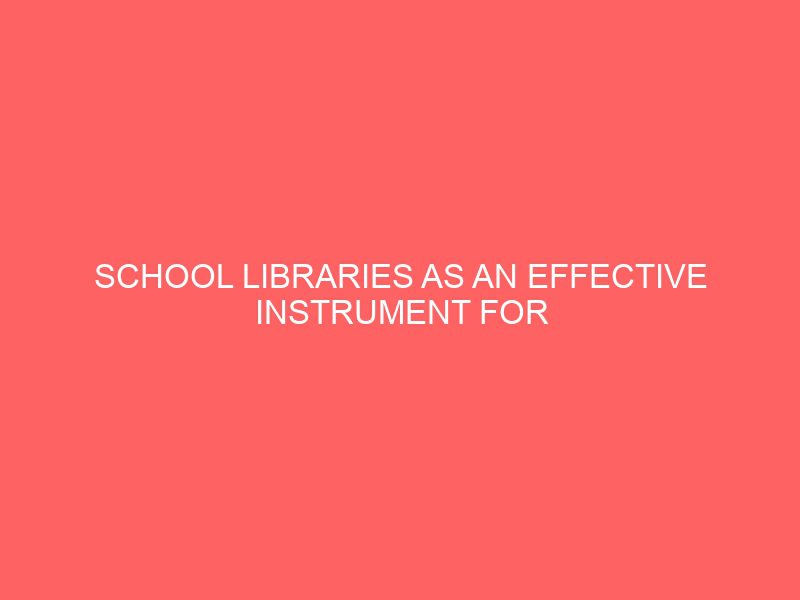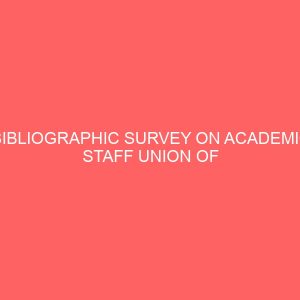Description
CHAPTER ONE
INTRODUCTION/BACKGROUND OF STUDY
This research is on School libraries as an effective instrument for achieving academic excellence a case study of schools in Owerri town.
The word according to the new Lexicon Webster Dictionary of the English language. Library is defined as a room or building housing a collection of books usually arranged according to same plan. Such collection of book on related topics issued by a publisher.
The library has collection of records of human culture in print and non-print information purveying materials housed, preserve, organized, interpreted and managed by a professional librarian, to meet the broad and varying needs of users or clientele, for their information, knowledge, education, research, recreation and aesthetic appreciation.
However the word library is defined as a room or building containing books that can be looked at or borrowed by members of the public or members of the group or organization that owns the library.
According to Longman Dictionary of English language and culture; A building in which collections of books, CDs, newspapers, etc are kept for people to read, study or borrow.
The library is an integral part of any academic institution where it is situated and no such institution can achieve its well throughout objectives without the library. It is not an adjunct to the parent institution, but an indispensable part. It is necessary to have library in our post primary schools because it is the central organ of an academic institution which determines the excellence of the institution in teaching and learning. School libraries are found in elementary post primary and higher schools and house the materials and services that students and teachers requires to carry out their academic activities. Their holdings consist of printed an audio-visual materials that support and extent the curricula and that attempt to make reading attractive to students.
According to encyclopedia Americana, they offer reference and inter-library loans in terms of size, 54.6% of school libraries have fewer than 2000 books, while 3% have more than 10000% books. In the early 1990s there were approximately 3500 school libraries in Mexico, representing a 24% increase in just two years. School libraries have also extended their missions and the level of their services in recent years.
Furthermore, from the above one can see that the school library has a remarkable role in academic excellent of students because the process of teaching and learning cannot be effectively done without incorporating the library of secondary education system. It is therefore an instrument of education excellence. In this regard Ishola (2002) says That whose function is to broaden the education of students by introducing them to spheres of knowledge outside the narrow confines of their school curriculum.
The school library can serve as follows:-
i. Resource center: Offers a wide variety of materials that information is not only stored in print form but also in non-print.
ii. Teaching Agency: Teacher students various skills which when acquired enhances their academic performance and discourage leaving by rote.
iii. Services Agency: Offer various services users to aid them make maximum utilization of the library resources.
iv. Recreation Agency: Guides students in their research work involving using the library by providing minor reference assistance to them.
v. Educational Agency: This is the overall development of an individual, growth, progressive reconstruction of experience and a life long process. The educational roles of the school library are:-
a) Inculcation of permanent literacy
b) Promotion of early child education
c) Enhancement of secondary education
d) Development of reading habits.
The school libraries thus has challenged the functions of parents, teachers, classroom and the various institutions that were formerly the exclusion, sources of knowledge and information.
The characteristic of the school library:
1. User: They are made up of the pupils, students and teachers. Some are more intelligent than others or some are eager to read while others are backward. The libraries should give more attention to the less intelligent once in order for them to meet up.
2. Contents: It contains materials that are book and non-book materials also contains materials based on the syllables and subjects taught at school chosen on basis of its individual merit considering the special needs and problem of the institution and the medium that most effectively conveys the desired content so that its objective will be met.
3. Location: It is part of the school community. They are to achieve the objectives of the school that set it up the library as a complement.
4. Functions: It is an integrating factor in the work of the school. The work of the school library is directed towards the definite education aims of the school.
A large percentage of pupil and students in nursery, primary and secondary schools are ignorant of the fact that personal intelligence and more knowledge of a subject does not automatically establish firm knowledge of a subject and excellence in school, the school library is an invaluable and for achieving academic excellence. Also teachers, parents and libraries are today concerned about the poor reading habits of our students, poor performance at school and fall in our educational standard. This cry has invariably elicited very passionate question in the minds of those who love and care of all round development of these students. The libraries are yearning collectively on how to combat this problem knowing the adverse effect of this ailment first in the lives of the pupils and students, secondly in the progress of a country like ours.
The relationship between school libraries and reading habits and that between school libraries and academic excellence has been a subject of theoretical interest and practical importance amongst librarians. However, this relationship has been established through effective reading and general success in academic pursuit. In the primary schools, the library laid the foundation for reading habits by importing reading skills at the formation stage of the pupils education. In the secondary schools they form the foundation for independent learning at present school and at successive stages of the students life by establishing firmly the reading habits acquired in the primary school. Also the school library communicates information from several information carries, for better understanding and broadcasting of knowledge and there produce profound effects on the various categories of the students populace who acquire the skill of utilizing and assimilating information from the library, thus become more successful than others by virtue of information and knowledge they possess via the library collections.
It was in view of this that Morgan (2003) asserts that in the hands of a cultured teacher the school library may serve as a link to bind together the home and school, and to arouse the interest of parents in what and how their children are reading, by referring them to the library.
Teachers can suggest to pupils valuable books suitable for their age, attainment, tastes and necessities. Seldom does a day pass when the vigilant teacher has not an opportunity, either in a class or in private conversation, to drop into the prepared soil of pupils mind a hint of some valuable books to read in the library.
In conclusion there is no better intellectual and moral influence than that which comes from reading a good book aloud in the family circle Morgan (2003) concludes that:-
Learning with tear is now a thing of the past like wise learning from single textbook. As every good and resourceful teacher knows one of the crimes or worst sins a teacher can commit against his students is to feed them with wrong and outdated information, also for the purpose of education to be fully achieved, students and teachers need to consult several source for better understanding and clarity. Also, nothing could be as dangerous as ignorance and an ill-informed student as they fall prey to rumors and false propaganda. The library selects, acquires and store in a classified arrangement on shelves the best and up-to-date sources of information that keeps staff and students abreast of new developments in knowledge and understanding of the subject matter, encourage practical work and develop the powers of analytical appraisal and of critical thinking.
Learning can be one of the most exciting experience in life, while reading is identified as the single most important determinant of a childs success at school and in modern society as well. Learning also in modern life depends largely upon ones ability to interpret the printed messages accurately and fully, while reading is an educational task, essential for ones excellence in all academic pursuits. He who has other reasons for learning and reading besides interest in the subject has everything going for him, his interests broadens and cheap source of information during childhood education. Thus ideas absorbed from reading and learning through then remains with the students for the rest of their lives and produces profound effects and influences on their academics. Also the school library in no small measure plays a great part on the attitudes, behaviors, aspiration academic pursuits embarked upon by students and in determining the kind of people they can be
Good readers who have mastered the tasks of reading agree that early exposure to a wide range of printed materials is a highly relevant factor in reading. The handicap most secondary schools students face in reading development is lack of good reading materials. The school libraries are indispensable in the area of provision and proper use of books, this have made them the forum on which the educational activities of our secondary school revolves. It behaves on students numerous information sources to exploit so as to enhance their academic performance and to excel. This way, it lays foundation for a brighter future. Knowledge acquired from the information embedded, in the library and resources is like a fortune rightly acquired. For it is Òthe heart of the institution and the apex on which the intellectual life of the school and student rest.
1.2 HISTORICAL BACKGROUND OF SECONDARY SCHOOL LIBRARIES IN OWERRI TOWN
The development of secondary school libraries in Owerri town could not be treated in isolation from that of school libraries in general in Owerri which commenced in the early 1950Õs.
This historical development of secondary schools library started in government secondary school, Owerri now government college, Owerri which was established in 1952 and modern school, Owerri now Girls Secondary School, Owerri established in 1955.
Libraries in secondary school are established in government trade center, which serves the educational (Technical) needs of those students in the technical education sector.
Moreover, due to the type of materials the library stock, it could not serve the general interest of the students in Owerri town. For this reason another library was established in the modern school, Owerri which now serve various categories of students. Despite the type of materials that the library stocked it contributed immensely to the educational development of the town. This was the state affairs until another library was established in the government secondary school which before then serve as a book depot for schools in the then Eastern region, as it was from there that books meant for primary and secondary in the eastern region sent by the then Colonia government were deposited for the various number of volumes of books meant for their school. However, it must be noted that the central library at Enugu was also providing library service known as Òlibrary on wheelsÓ to schools in Owerri town (secondary school) before the war, (Nigeria civil war). This factor led to the promotion of the establishment of libraries in secondary schools in Owerri town which were though largely organized and were left to the part-time of teachers. The libraries then in some of these schools were either location in one classroom or found to be in the principals office.
In 1955 the Government College, Holy Ghost College, Girls Secondary School Owerri were founded. The Government Technical College, Owerri was founded in 1952, Federal Government Girls College, 1973 and Bishop Lasbrey Girls Secondary School, 1952 become secondary school in 1986.
In 1957 a library was established in the government college with the aid of the books deposited in the institution. Then a teacher librarian was trained by the administrators who were white men at Enugu. It has the largest volume of books amongst all the schools in Owerri town which strives till today. The library building had a statue of students clutching a book in a round-about in front of the library to indicates the building. The person in charge of the library holds a degree in library science education.
The Government Technical College Library was established in 1956 for students in the technical and trade sector of education. Its resources is limited to the type of courses offered in the college. This is an N.C.E graduate in technical in education but with librarianship. With background knowledge of librarianship acquired through attending seminars, workshops, conferences and long period of the classroom complex which is located in a large hall. It has volume of books ranging between 1000 to 1500.
In 1973, the Federal government Girls Secondary School Owerri was established and in 1974 was founded. The library caters for the interest needs of students in the secondary section and those in higher school section (lower and upper sixth students) this accounts for its large number of volumes of 3,500. The library is manned by a professional librarian with a bachelor of library science degree. Since 1973 the school has achieved its inception. The library is allocated an entire building and has links with the academic feats.
After the conversion of Bishop Lasbery Girls Secondary School Irette to a secondary school then the library was established in 1986, which is located in one classroom and manned by a teacher librarian. The library has volumes of books ranging between 800 to 1000.
1.3 STATEMENT OF THE PROBLEM
This study is the investigation of the extent to which school libraries contribute to academic excellence. Also school libraries has effect on the pupils, students and teachers and their indispensable contributions to the teaching and learning programs of the schools is yet to be fully understood. As a result of this problem, what this research study tries to portray is the mechanism by which the school libraries comes about it.
1.4 OBJECTIVE OF THE STUDY
The library is a central focus because in every academic institution. The learners and educators achieve this objective through the library which serves as the vehicle of communication or transmission of scholarly knowledge for educational excellence.
School libraries are very indispensable for effective teaching and learning process. The main aim of this study is the town in relation to their academic performance.
1. To know the impact of school library and program on its various patrons
2. To find out the impact of reading culture and library skills acquisition on students performance.
3. To know the extent to which library collections impact knowledge.
4. To examine the service of the school library.
1.5 SCOPE OF THE STUDY
The scope of this study is limited to schools in Owerri town. This covers three boys and three girls secondary school. These six secondary school represent all the geographical area in Owerri town.
1.6 SIGNIFICANCE OF THE STUDY
This study is significant because it will benefit the following:-
1. School libraries should be able to perceive and teach the students on how to use the library as data banks of information and knowledge for self directed learning and research.
2. Teachers will know that in order for a student to cope academically and other wise he/she has to become self reliant in obtaining and utilizing information.
3. Parents guardians are to be acquainted with vital role of the school library and its overall impact on the academic pursuits of their children.
4. The school principals should also include the habit of using the library in the life of the students.
5. The state government will also recognize the importance of libraries in the secondary education from this research.
1.7 RESEARCH QUESTIONS
1) Has any impact of such library on its patron?
2) Does reading culture and skills acquired impact on the performance of the students?
3) To what extent do the collections imparts knowledge on the users?
4) What are the services provided by the school library?
1.8 DEFINITION OF TERMS
1) According to the new Lexicon Webster Dictionary, school is a community of those who teach and those who are taught, especially one of the education of children, usually housed in a building design and equipped for this purpose. The purpose to be achieved is transmission of knowledge, cultural and social values which are acceptable from one generation to another. Also all these should be recorded and preserved in book and other information carrying media, which are collected and preserved by the library for the users to make use of.
2) Library is defined as a room or building housing a collection of books usually arranged according to some plan. Such collection of book on related topics issued by a publisher.
3) Education: Is a process of teaching training and learning especially in schools to improve knowledge and develop skills. Example Nursery, primary, secondary and higher education.
4) School libraries are an information agency, they provide ready access to this information and is indispensable to a pupils or students advancement or self development. The right information at the right time, at the right place to improves the ability of a student, pupils or teacher.
5) Questionnaire: It defined as set of question relating to the aim of the study and the hypothesis to be tested to which the respondents are expected to answer in writing.
6) Sampling techniques: Is a techniques or method used to minimize error and bias in the study. It also the method that all the elements have equal probability of being selected for investigation.







